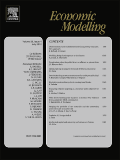
ECONOMIC MODELLING
Scope & Guideline
Driving the Evolution of Economic Thought and Application.
Introduction
Aims and Scopes
- Macroeconomic Analysis:
The journal focuses on macroeconomic modeling, including the study of business cycles, inflation, and the impact of fiscal and monetary policies on economic stability. - Microeconomic Foundations:
Research often delves into microeconomic factors such as firm behavior, consumer choice, and market structures, using advanced econometric methods to derive insights from empirical data. - Environmental Economics:
There is a significant emphasis on environmental policies and their economic implications, particularly in the context of climate change, carbon pricing, and sustainable practices. - Financial Economics:
The journal covers topics related to financial markets, including asset pricing, risk management, and the effects of regulatory changes on financial stability. - Trade and Development:
Research related to international trade dynamics, development economics, and the impacts of globalization on local economies is a core focus area. - Behavioral Economics and Decision-Making:
The journal includes studies that explore behavioral aspects of economic decision-making, examining how psychological factors influence market outcomes. - Quantitative Methods and Modeling Techniques:
A distinctive feature of the journal is its commitment to using advanced quantitative methods and models, including DSGE models, agent-based simulations, and machine learning techniques.
Trending and Emerging
- Digital Economy and Transformation:
Research exploring the implications of digitalization on economic performance, business models, and consumer behavior is rapidly gaining traction, especially post-COVID-19. - Sustainable Development and Green Economics:
There is a rising focus on sustainable economic practices, including green finance, corporate social responsibility, and the economic impacts of environmental regulations. - Health Economics and Policy:
In light of recent global health crises, studies examining the economic impacts of health policies, healthcare access, and the interplay between health outcomes and economic performance have become increasingly important. - Behavioral Insights in Economic Decision-Making:
Emerging research incorporates behavioral economics to understand how cognitive biases and social factors influence economic decisions, particularly in financial markets. - Impact of Global Events on Economic Dynamics:
The journal is seeing more studies analyzing the economic impacts of global events, such as pandemics, geopolitical tensions, and climate change, emphasizing the interconnectedness of economies. - Machine Learning and Big Data in Economic Analysis:
The integration of machine learning techniques and big data analytics into economic modeling and forecasting is a significant trend, reflecting advancements in technology and data availability.
Declining or Waning
- Traditional Labor Economics:
Research specifically focused on traditional labor economics, such as wage dynamics and employment rates, has become less prevalent, possibly overshadowed by the more impactful themes of labor market disruptions due to technology and globalization. - Single-Factor Economic Models:
There has been a waning interest in simplistic single-factor models that do not capture the complexity of economic interactions, with researchers preferring more integrated approaches. - Static Econometric Models:
The use of static econometric models is declining in favor of dynamic models that account for time-varying relationships and structural changes in economic data. - Region-Specific Studies:
Research focusing on specific regions without broader implications or comparisons has decreased, as there is a growing preference for studies with global relevance or comparative analyses. - General Equilibrium Models with Simplistic Assumptions:
There is a noticeable decline in the application of general equilibrium models based on overly simplistic assumptions, as researchers increasingly recognize the need for more nuanced frameworks.
Similar Journals
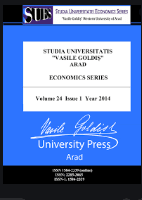
Studia Universitatis Vasile Goldis Arad Seria Stiinte Economice
Pioneering Insights for Future Economists and ManagersStudia Universitatis Vasile Goldis Arad Seria Stiinte Economice is a distinguished academic journal published by SCIENDO, proudly contributing to the fields of Business, Economics, and Management since its transition to an open access format in 2007. With an ISSN of 1584-2339 and E-ISSN 2285-3065, this journal offers a platform for rigorous research and scholarly discourse, earning a respectable Q3 category ranking in 2023 across various domains such as Business and International Management, Economics and Econometrics, Finance, and Strategy and Management. The journal, situated in Poland, plays a pivotal role in disseminating knowledge and fostering innovation, thus serving as a valuable resource for researchers, professionals, and students committed to advancing their understanding of economic sciences. With Scopus rankings highlighting its competitive position within its categories, Studia Universitatis Vasile Goldis Arad is not just a journal, but a vital cornerstone for the academic community seeking to explore contemporary issues and strategies in the ever-evolving economic landscape.
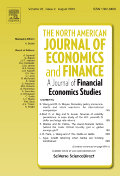
North American Journal of Economics and Finance
Uncovering insights in finance and economics.The North American Journal of Economics and Finance is a premier academic journal published by Elsevier Science Inc. since 1992, dedicated to advancing the field of economics and finance through rigorous research and scholarship. With an impressive impact factor and recognition in the Q2 category for Economics and Econometrics and Q1 for Finance as of 2023, this journal holds a significant position in the academic community, ranked #41 out of 317 in Finance and #100 out of 716 in Economics. The journal features high-quality, peer-reviewed articles that cover a broad range of topics, from theoretical frameworks to empirical analyses and practical applications. Though not an open-access platform, the journal provides valuable insights for researchers, practitioners, and students alike, promoting knowledge dissemination in the dynamic landscape of economic and financial studies. With its commitment to excellence, the North American Journal of Economics and Finance serves as an essential resource for those seeking to deepen their understanding of contemporary issues in these critical fields.
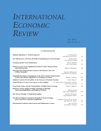
INTERNATIONAL ECONOMIC REVIEW
Fostering scholarly dialogue in economics and econometrics.INTERNATIONAL ECONOMIC REVIEW is a prestigious journal dedicated to advancing knowledge in the fields of economics and econometrics. Published by Wiley in the United Kingdom, this journal boasts an impressive Q1 ranking in the 2023 category of Economics and Econometrics, reflecting its significant impact in the academic community. With a continued publication since its inception in 1979, it offers a platform for rigorous scholarly articles that address contemporary issues, theoretical developments, and empirical findings in economics. Although it does not currently offer open access options, the journal maintains broad accessibility through institutional subscriptions. Researchers, professionals, and students are encouraged to contribute to and engage with this leading publication to foster knowledge exchange and stimulate scholarly dialogue in economic research. With its commitment to high-quality scholarship, the INTERNATIONAL ECONOMIC REVIEW remains a vital resource for developing insights that inform both policy and practice.

International Advances in Economic Research
Pioneering Insights in the World of EconometricsInternational Advances in Economic Research, published by SPRINGER, stands as a significant resource within the field of economics and econometrics, consistently contributing to the theoretical and empirical understanding of economic phenomena since its inception in 1995. With an ISSN of 1083-0898 and E-ISSN of 1573-966X, this journal is dedicated to advancing economic research through a rigorous peer-review process and disseminating high-quality scholarly articles. The journal's esteemed classification places it in the third quartile (Q3) within the Economics and Econometrics category for 2023, indicating its respectable standing in academic circles. It serves as an important conduit for the dissemination of innovative economic theories, data analysis, and policy discussions, appealing to researchers, professionals, and students alike. Though not an open-access journal, it provides valuable subscription-based content that enriches the understanding of diverse economic issues and fosters a community of inquiry among academics. With its projected outlook extending to 2024, International Advances in Economic Research continues to be an essential platform for scholars aiming to influence and engage with contemporary economic debates.
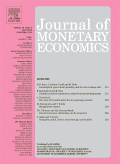
JOURNAL OF MONETARY ECONOMICS
Empowering Scholars in the Realm of FinanceJOURNAL OF MONETARY ECONOMICS, published by Elsevier, stands as a premier platform for scholars and practitioners in the field of monetary economics. With a robust ISSN of 0304-3932 and E-ISSN 1873-1295, this esteemed journal has maintained a significant influence since its inception in 1975, continuing its legacy of rigorous scholarship through to 2024. The journal is recognized for its high impact in the field, boasting a Q1 category in both Economics and Econometrics and Finance as per the 2023 rankings. Its Scopus rankings underscore its prominence, with a top percentile standing in critical categories—a testament to its critical role in advancing research and discourse. While not an open-access publication, it offers invaluable insights for those dedicated to understanding complex fiscal dynamics and economic policies. The Journal of Monetary Economics serves as an essential resource for researchers, professionals, and students eager to explore the intricacies of financial systems and economic theory.
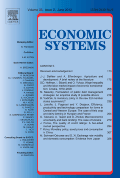
Economic Systems
Transforming understanding of economic challenges today.Economic Systems is a premier academic journal published by Elsevier, specializing in the dynamic field of economics and econometrics. With an ISSN of 0939-3625 and E-ISSN 1878-5433, this journal is known for its rigorous peer-reviewed articles that delve into economic theory, policy analysis, and empirical research, making it an invaluable resource for researchers, professionals, and students alike. Based in the Netherlands, the journal has established a strong reputation, evidenced by its Q2 ranking in Economics and Econometrics and a commendable position within the 74th percentile of its category in Scopus rankings. Covering a breadth of topics relevant to contemporary economic systems, from their structural assessments to real-world applications, Economic Systems aims to inform and advance the discourse within the field. While it operates under a subscription model, the journal ensures accessibility to groundbreaking research, encouraging a deeper understanding of the economic challenges facing today’s societies.
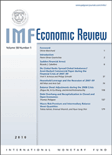
IMF Economic Review
Advancing Economic Insights for a Global AudienceIMF Economic Review, published by Palgrave Macmillan Ltd, stands as a preeminent journal in the fields of Economics and Business Management, holding a prestigious Q1 ranking in both categories as of 2023. With an ISSN of 2041-4161 and an E-ISSN of 2041-417X, this journal not only showcases high-quality, peer-reviewed research but also embraces the principles of Open Access, promoting wide dissemination of its findings to researchers, professionals, and students alike. Spanning significant years from 2010 to 2024, the IMF Economic Review features innovative analyses and insights that challenge conventional economic paradigms and foster deeper understanding of global economic dynamics. Its impressive Scopus ranking places it in the top 10% of economics journals globally, affirming its vital role in advancing academic discourse and practical application in economics and finance. For those dedicated to exploring the intricacies of economic theory and practice, the IMF Economic Review is an invaluable resource that not only informs but also inspires.

Annual Review of Financial Economics
Advancing the Frontiers of Financial KnowledgeAnnual Review of Financial Economics, published by Annual Reviews, stands as a pivotal journal in the fields of Economics and Finance, recognized for its rigorous analysis and comprehensive reviews since its inception in 2010. With an impressive impact factor reflected in its Q1 ranking in both Economics and Econometrics and Finance for 2023, this journal serves as an essential resource for researchers, professionals, and students keen on understanding the dynamic interplay of financial theories and practices. The ISSN 1941-1367 and E-ISSN 1941-1375 signal its commitment to accessibility and dissemination of cutting-edge research within the community. Addressing crucial topics from market behavior to economic modeling, each annual volume synthesizes the latest findings and theoretical advancements, thus contributing significantly to the global discourse within financial economics. With its high Scopus rankings, including a finance rank of #75 out of 317, the journal continues to foster a deep understanding of financial systems and their implications, serving as an invaluable tool for anyone engaged in the broader economic landscape.

Quantitative Finance and Economics
Unlocking Financial Potential with Data-Driven ResearchQuantitative Finance and Economics, published by the American Institute of Mathematical Sciences (AIMS), is a pioneering open-access journal committed to advancing the fields of finance and economics. Established to disseminate high-quality research, this journal has been an open-access platform since 2017, promoting wider accessibility to vital academic findings. It serves as a crucial resource for researchers and professionals alike, offering valuable insights through rigorous studies in quantitative methods that influence financial and economic decision-making. Although current Scopus rankings indicate emerging challenges, with a rank in the lower percentiles across various categories, Quantitative Finance and Economics strives to gain recognition by bridging theoretical frameworks with practical applications. The journal invites contributions that explore innovative quantitative techniques and their implications in contemporary economic scenarios, thus underscoring its role in shaping discourse and research in this critical sector.

Eurasian Economic Review
Unlocking the potential of Eurasian economic studies.Eurasian Economic Review is a premier academic journal dedicated to the dissemination of high-quality research in the field of economics, notably within the Eurasian context. Published by SPRINGER HEIDELBERG in Switzerland, this journal stands out with an impressive Q2 ranking in the 2023 category of Economics, Econometrics and Finance, reflecting its influential role in fostering scholarly dialogue. The journal encompasses a broad array of topics related to economic trends, policy impacts, and theoretical advancements, making it an essential resource for researchers, professionals, and students alike. With a consistent output since its inception in 2011, the Eurasian Economic Review is committed to providing open access to its valuable content, ensuring that important findings are widely available to the global research community. As a member of the top 9th percentile in Scopus rankings for its field, this journal uniquely positions itself as a vital conduit for innovative and impactful research in economics.